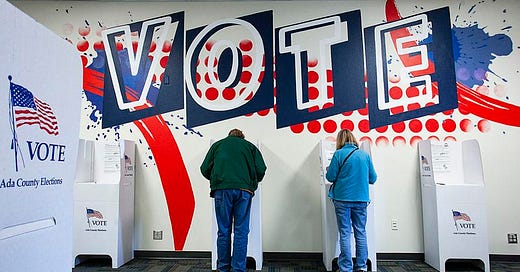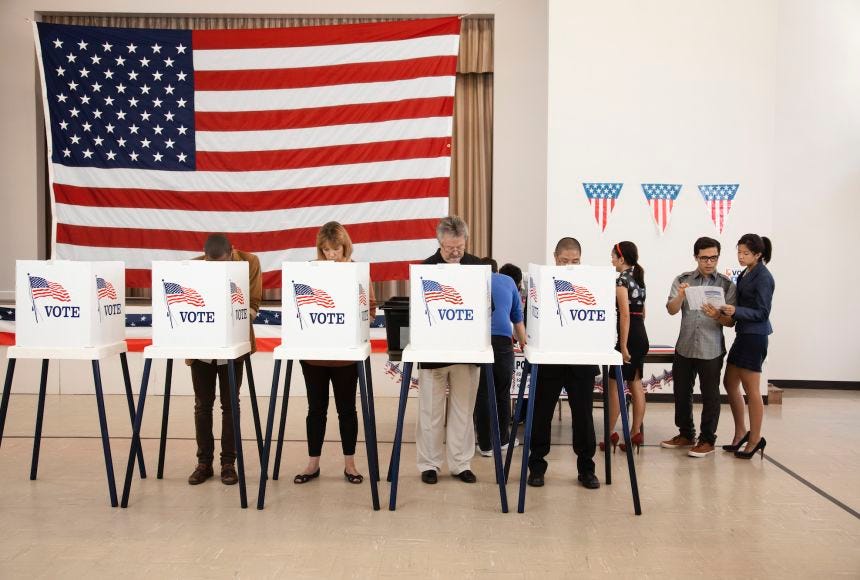WHY SHOULD YOU VOTE?
BECAUSE IF YOU DON'T VOTE, YOU WON'T HAVE A SAY IN HOW OUR COUNTRY IS RUN
NO VOTE. NO VOICE
Increasing the number of people that vote in each election means better representation, more funding to our communities, and a better quality of life. Politicians listen to two things, money and votes. If we work together as a community and increase voter turnout, then our state and national legislators will listen to our needs. Education, healthcare, immigration, infrastructure, the economy, our veterans, etc. are all affected by our vote.
If we all work together to increase voter turnout, our country, our community, everyone, will benefit through job growth, better healthcare, better education, better infrastructure, a better economy, safer neighborhoods, and most importantly a better quality of life for our families. Irregardless of what the MAGA-GQP is saying, Its time to change the status quo and improve the lives of everyone we care about through voting, because
our voice matters
Now, let’s talk about voting rights.
Know the 15th Amendment, understand it, and, on this day, National Voting Registration Day, talk to your neighbors, family, friends. Spread the word!
“Voting is your civic duty.” This is a pretty common sentiment, especially each November as Election Day approaches. But, what does it really mean? And, what does it mean for Americans in particular?
Americans Voting
Typically in the United States, national elections draw large numbers of voters compared to local elections. (HILL STREET STUDIOS)
By voting, we as citizens are participating in the democratic process. We vote for leaders to represent all of us and our ideas, and the leaders we elect support our interests.
There are two special rights only for U.S. citizens:
Voting in federal elections
Running for federal office.
White men, age 21 and older, who owned property were given the right to vote in 1776.
The 15th Amendment to the Constitution removed racial barriers to voting in 1870, but states continued to practice voter discrimination and continued to deny Black voters a chance to participate in elections.
The right to vote was extended to white women in 1920.
It wasn't until 1965, after years of intimidation, murders, and advocacy that the path to the voting booth was cleared for Black people with the federal Voting Rights Act of 1965.
THE RIGHT TO VOTE, REGARDLESS OF RACE
The right to vote, regardless of race led a peaceful civil rights march in Selma, Alabama, led by Dr. Martin Luther King, Jr. Eight days later, President Lyndon B. Johnson announced his intention to pass a federal Voting Rights Act to ensure that no federal, state, or local government could in any way impede people from voting because of their race or ethnicity.
PROVISIONS OF THE VOTING RIGHTS ACT
Originally, legislators hoped that within five years of its passage, the issues surrounding the 1965 Voting Rights Act would be resolved and there would be no further need for its enforcement-related provisions. They were wrong. Congress had to extend these provisions in 1970, 1975, 1982 and most recently in 2007, this time for 25 years.
Enforcement measures included:
Requirements for certain jurisdictions with a history of disenfranchising voters to obtain approval or "preclearance" from the U.S. Department of Justice or the U.S/ District Court in D.C. before they can make any changes to voting practices or procedures. They must prove that the proposed change does not denying or infringe on the right to vote on account of race or color.
Requirements for certain jurisdictions to provide language assistance to voters in communities where there is a concentration of citizens who do aren't proficient in English to actively participate in the electoral process. This provision was added to the Voting Rights Act in 1975.
Federal election examiners and observers for certain jurisdictions where there is evidence of attempts to intimidate minority voters at the polls.
“It is wrong, deadly wrong, to deny any of your fellow Americans the right to vote in this country. There is no issue of states rights or national rights, there is only the struggle for human rights.”
- President Lyndon B. Johnson (1965)
SAFEGUARDING THE RIGHTS OF BLACK AMERICANS AND OTHER MINORITIES
The Voting Rights Act of 1965 remains one of the hardest-fought safeguards for Black Americans and other minority groups as it relates to voting. The power, agency, and access to vote is a civil right for all. The most recent attempt to strenghen the right to vote is the John Lewis Voting Rights Advancement Act. Introduced in Congress in early 2019, the proposed bill was renamed following the passing of civil rights activist and long-time House of Representatives member, John R. Lewis (D-GA).
It all boils down to us, the citizens, the people, to exercise our right to vote. No natter how difficult they make it for us to get to the polls, to vote, we MUST EXERCISE OUR RIGHTS TO VOTE!
Enough said! Register. If you are already registered, make sure you are registered. As I said on a previous post today. I was registered to vote. I went to the county website and checked and they didn’t have any information for me being registered! I had to register again!!!
It’s OUR COUNTRY!
It’s OUR VOTE!
*******************************************
https://education.nationalgeographic.org/resource/why-voting-important/
https://naacp.org/find-resources/history-explained/legislative-milestones/voting-rights-act-1965







Excellent, Daniel!